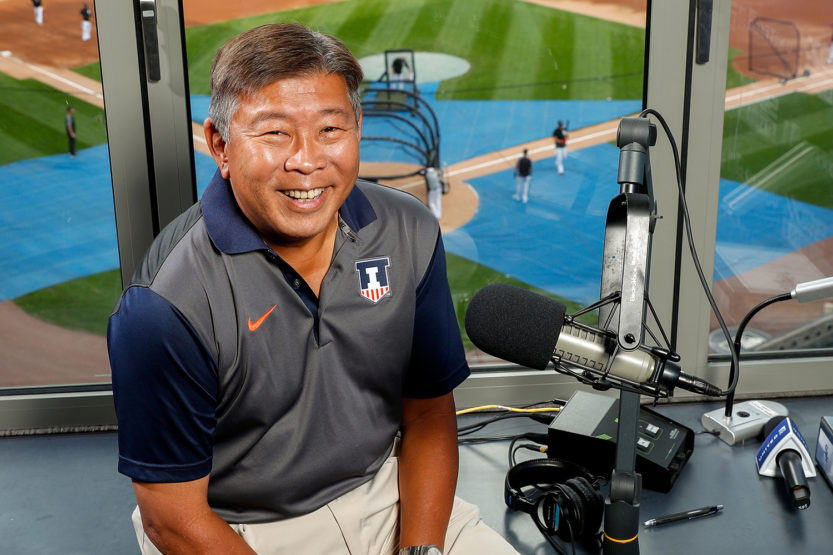Alumni Interview: Gene Honda
 “I’ve stayed true to what I learned at WPGU,” says longtime sports announcer
Gene Honda. (Image by Steve Woltmann)
“I’ve stayed true to what I learned at WPGU,” says longtime sports announcer
Gene Honda. (Image by Steve Woltmann) I like to joke that I graduated from the U of I in four terms: the Nixon, Ford, Carter and Reagan administrations. It’s not that I was a slow student, though I’ll admit I never made a dent in the dean’s list. What slowed me down was indecision.
When I showed up on campus in 1972, I wanted to be an engineer. That was the year of my best GPAs, but it didn’t feel right. Not good enough at math. I switched to finance before finding my way to WPGU, the University’s radio station, and going down the rabbit hole to my future.
It was practically a real rabbit hole. The studios were in the basement of Weston Hall. But the people down there were so interesting! They taught me how to announce everything from hard news to a commercial for your friendly local Chevrolet dealer. Most of it was teaching by example. The faculty was great, but when I think back to my WPGU days, it’s the other student broadcasters I remember. My work ethic was just trying to keep up with them.
There was a handbook for WPGU trainees in those days. On the first page it said, “Welcome. People think you need a deep masculine voice or a soft feminine voice to succeed on the air. This is not true. All you need is to be conversational.”
It’s not the voice that counts. It’s whether you can be conversational with a microphone in your face.
After college, I went from WKIO in Champaign to various radio gigs. Then in 1985, the Chicago White Sox’ public address announcer, Wayne Messmer, followed Harry Caray from the South Side to the Cubs, and I applied for his job. Why not? The Sox must have liked the tape I sent them because they called me in for an interview.
It’s not the voice that counts. It’s whether you can be conversational with a microphone in your face.
Whoever took over from Wayne Messmer was going to have big shoes to fill. Wayne had not only served as the P.A. announcer, he also sang the national anthem in a booming baritone. So I was in trouble when the Sox asked, “Can you sing?”
“Not a note.”
“Oh. Well, then …”
And guess what? They were joking! “We’ll give you the job anyway.”
Almost 35 years later, I’m still in the booth for the White Sox. That gig has been rewarding professionally and personally. Fans liked the way I said Frank Thomas’ name, and so did Frank. Today, we joke that he only gets introduced “the old way” at Old-Timers’ games.
Since then, I’ve branched out a little. Besides Sox games at Guaranteed Rate Field, I announce Blackhawks hockey at the United Center, DePaul Blue Demons basketball, the Big Ten Tournament and the Final Four, plus a pretty full schedule at WTTW, Chicago’s PBS station.
Not to mention a special favorite of mine, Fighting Illini football. Just don’t ask about the Iowa game—I wasn’t there that day!
Over the years, I’ve stayed true to what I learned at WPGU. Be conversational, be yourself, and get the names right. Hello, Giorgi Bezhanishvili! For an announcer, NCAA basketball is the toughest assignment. Baseball and hockey give you time to catch your breath, but there’s always something happening in college hoops. I still get butterflies before every assignment, hoping to do my best—to do justice to the hard work the athletes do on the field or on the court. After a basketball game, I’ll be as sweaty as some of the players.
These days, I often talk to students who aren’t sure what to do with their lives. Some of them say, “I don’t want to go to a big school.” And I cringe because I don’t want them to limit their options. How many of us wind up following the career path we started out with when we went to college? I sure didn’t. But at a school the size of Illinois, you can find your way to something that suits you better than what you expected when you started. A school the size of Illinois gives a student so many more options.
I’m a prime example. I jumped out of the engineering program to something that suited me better, and for that opportunity, I’m still saying, “Thank you, U of I.”

